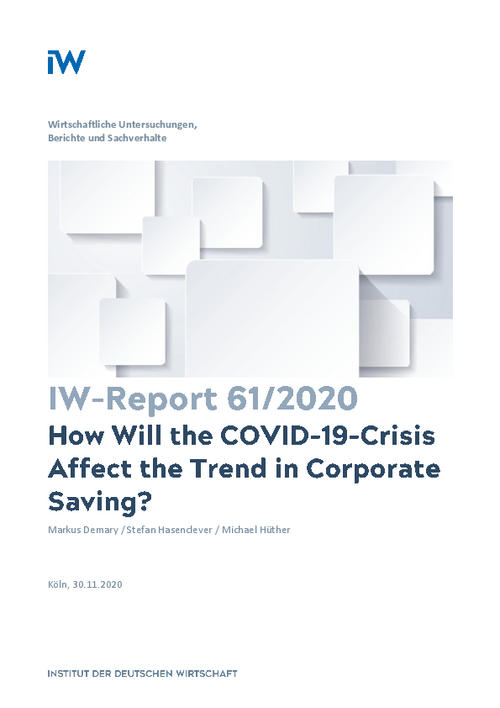In this paper we aim to shed light on the global trend in rising corporate saving over the last three decades and to discuss the effects that the Covid-19 crisis might have on companies’ saving behaviour.

How Will the COVID-19-Crisis Affect the Trend in Corporate Saving?
IW-Report

In this paper we aim to shed light on the global trend in rising corporate saving over the last three decades and to discuss the effects that the Covid-19 crisis might have on companies’ saving behaviour.
To do so, we analyse the transition of the corporate sector from traditionally being a net borrower to becoming a net lender to the rest of the economy from a flow-of-funds perspective. In accordance with the literature, this analysis reveals that the trend in rising corporate saving is mostly pronounced in advanced economies that have been accumulating high and persistent current account surpluses, such as Germany, South Korea and Japan. In addition, we aim to analyse the various factors behind this trend by reviewing the literature. These range from the rise of uncertainty after the global financial crisis to the increased reliance on internal funding for research and development expenditures. To identify the potentially relevant factors for the German corporate sector we, subsequently, study the composition and development of Germany’s aggregated corporate sector’s balance sheet. We show that the rise in corporate saving is accompanied by an increase in equity capital and a reduction in the corporate sector’s reliance on banking loans. Finally, we discuss the possible impact of the current Covid-19 crisis on the trend of rising global saving. We argue that the Covid-19 crisis is most likely to interrupt the trend in corporate saving in the short run due to the decline in revenues. Nonetheless, similar to the pattern observed in the aftermath of the financial crisis we conjecture that the Covid-19 shock will probably strengthen corporate saving in the long run, as corporates may well aim to restore their liquidity and equity capital buffers to be better prepared for future shocks. This will further unfold downward pressures on real interest rates and complicate the conduct of monetary policy.

Markus Demary / Stefan Hasenclever / Michael Hüther: How Will the COVID-19-Crisis Affect the Trend in Corporate Saving?
IW-Report


Fin.Connect.NRW-Fachveranstaltung: Banken werden klimaneutral – Welche Konsequenzen ergeben sich für Unternehmen?
Die globalen Megatrends Demografie, Dekarbonisierung, Digitalisierung und De-Globalisierung treffen auf die Industrieregion NRW. Um den Strukturwandel erfolgreich zu bewältigen, müssen die Unternehmen in NRW jährlich 98 Mrd. Euro in Dekarbonisierung und ...
IW
Wie hoch sind die Investitionsbedarfe in die klimaneutrale und digitale Transformation in NRW?
Für die Finanzierung der klimaneutralen und digitalen Transformation müssen in NRW jährlich mindestens 100 Mrd. Euro investiert werden. Dies ergab diese Meta-Analyse der vorhandenen Studien zum Investitionsbedarf in die Digitalisierung. Dabei fallen allein zur ...
IW